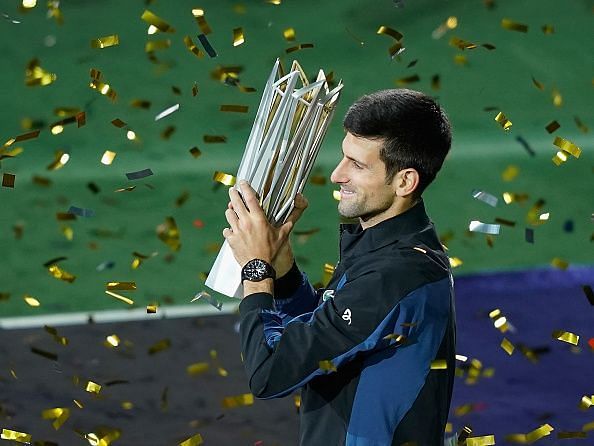
Magic in the mountains: How scaling Mont Saint-Victoire helped a stuttering Novak Djokovic regain his mojo
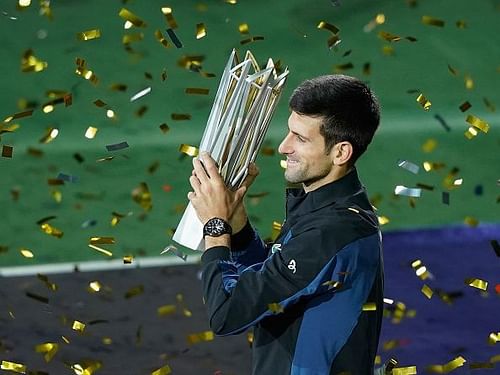
There is magic in the mountains; a mystic wisdom that one can only experience by venturing there themselves.
The statement rings especially true for Novak Djokovic, who ventured into the mountains of France for inspiration to reignite a stalling career.
But first a little perspective. When Djokovic shuffled off the court in Miami sporting a rather bewildered look on the back of yet another humiliating defeat, this time at the hands of Benoit Paire, it seemed like the Serb's career was finished. As had been the case with most great sportspersons, it appeared as though the fall would be drastic. After all, a foggy mind coupled with a problematic arm and lack of drive is not a concoction for success.
That was not where the drastic tumble down the rankings began though. By Djokovic's own admission, he had lost the motivation to perform to the best of his abilities ever since winning that elusive French Open title in 2016, completing the Career Slam in the process.
While many felt - and even hoped - that it would spur him on to even greater heights, possibly even help him eclipse the feats of Rafael Nadal and Roger Federer and for once be mentioned in the GOAT conversation, what transpired rocked the foundations of the tennis world. Having climbed the tallest of mountains, it was up to Djokovic to decide whether he wanted to stay there and admire the view from the top, or, well, just get back to the bottom. That's when the slide truly began.
“When nothing hurts, put a little stone in your shoe and start walking.”
Djokovic is a hard man to understand. From his commitment - or lack thereof - to gluten to his infatuation with yoga, the Serb is not your run-of-the-mill sportsman. Djokovic recently released a cookbook, which aside from elaborating on the various beneficial aspects of honey obtained from bees that feed on Manuka trees in New Zealand, contains a Serbian proverb that goes: “When nothing hurts, put a little stone in your shoe and start walking.”
After the 2016 French Open, Djokovic had no wounds to lick; no void to fill; no dream to fulfil. Basically, nothing hurt, at least until a Sam Querrey-shaped stone, nay boulder, came hurtling at him in the tranquil surroundings of London's All England Club.
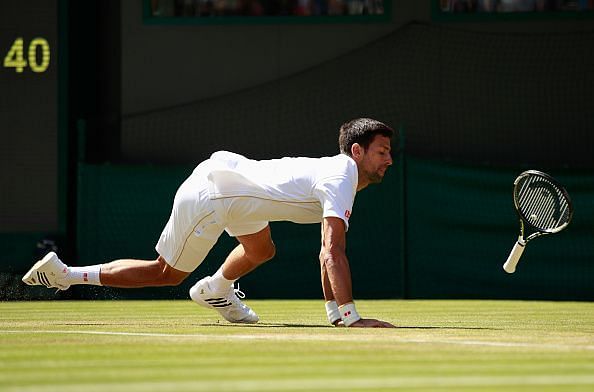
After relinquishing his No. 1 ranking to Andy Murray by the end of the year, Djokovic started the 2017 season looking like a pale shadow of the player he was in early 2016. Shocking defeats to Denis Istomin and Dominic Thiem in the Australian Open and French Open respectively were followed by a withdrawal from Wimbledon due to an elbow injury that would plague him for the next year or so.
Calling time on his 2017 season to focus on rehab, Djokovic vowed to come back stronger the next year, but an inspired display by Hyeon Chung in Melbourne put paid to the hopes of a dream return for the Serb. A lacklustre, insipid showing against Taro Daniel confirmed everyone's worst fears: Djokovic was indeed on the decline and it was much more rapid than anyone could have imagined.
Defeats to Dominic Thiem, Martin Klizan and Kyle Edmund followed and along with them emerged a rather alarming pattern. It wasn't just that Djokovic was still rusty and being outplayed, he seemed to be fatiguing after just two sets, unwilling to find that next gear he so often did prior to his injury. Going a break down in the third set seemed to be enough for him to throw in the towel and scurry off the court in Nick Kyrgios fashion. For a player who built a career out of winning mental battles and fighting for every single point until his body gave way, the manner of his defeats was extremely disconcerting.
"I feel I haven't lived up to your expectations, not even my own," Djokovic conceded morosely. "It's hard to deal with these types of games and defeats, I wasn't playing at my best, only during the second set. I will try to continue and see where it takes me."
Still, fans remained hopeful though. They had to. It was, after all, Novak Djokovic they were witnessing. The one man who had managed to break the Fedal stranglehold to carve a legacy of his own.
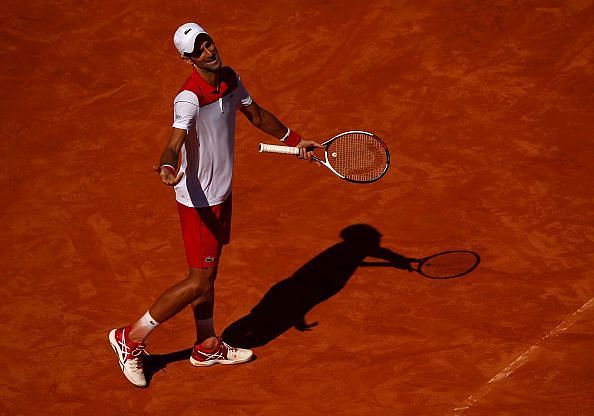
A deep run in Rome, where he was ousted by Nadal despite playing some high-quality tennis, looked to be turning point of the season for Djokovic. The backhand seemed to be slowly returning, the serve was becoming potent again, but the fitness was yet again under the scanner as he slowly but surely ran out of steam as the match progressed.
Djokovic arrived at Roland Garros quietly optimistic after his displays in Rome, but all that pre-tournament confidence took a mighty beating at the hands of unheraled Italian Marco Cecchinato. A wounded and seething Djokovic, at odds with himself, and unable to conquer the demons in his own head, conceded that he had no idea what the future held for him.
He also went on to rather shockingly claim that he might miss the entire Grass season, including Wimbledon, as he simply did not know which direction his career was heading. All he wanted to do, as he admitted himself, was to get away from tennis and spend some time with his family.
Magic in the mountains
Interestingly enough, the biggest decision Djokovic made in the season, arguably in his career, came during a period of startling uncertainty.
Opting to swap his racquet for a hiking staff, Novak set off on his mission to scale Mont. Sainte-Victoire, and right at the summit, looking down on the world below, was when it all came rushing back to him. The love that he had lost - and now was slowly getting back - for tennis, all the raw emotions and the passion came flooding back to him like a ball of snow gathering pace as it hurtled down a hill.
"I thought of tennis, thought of the emotion that tennis provokes in me," Djokovic later revealed. "It was all positives. I felt like I had a new breath for this sport."
It's amazing how a slight change in mindset can provoke such drastic changes in fortune. With all the cloaks of negativity cast firmly aside, the 31-year-old proceeded to tear his way through the Wimbledon draw, even ousting Nadal in one of the greatest Wimbledon matches of all time. The animalistic roars, the points to his head, the waves of emotion directed at his box; they were all back. More importantly, though, the drive to win had returned, as well as the machine-like consistency.
Sailing through Cincinnati and then the US Open, Djokovic remarkably claimed that he was inching ever so close to his best - the form he displayed in 2012 and even 2015 - but also announced that he wanted to find a whole new gear; a level he had never reached before. A strange admission considering it was easily one of the worst starts to a season he had ever had in his professional career.
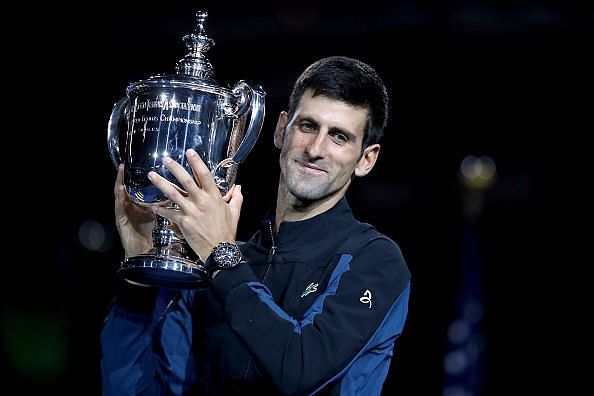
"I feel like I'm on a whole new level. That's kind of my approach and my thinking. I just want to create from this moment onwards the most that I can create for myself, to get the best out of myself in every possible moment. That's really what I'm thinking about."
When Djokovic is at his best, he goes about his business with robot-like efficiency, hitting groundstroke after groundstroke a foot within the baseline, refusing to give an inch and strangling his opponents like a boa constrictor. That was on full display in Shanghai, right from the opening point he played.
Dispatching the likes of Jeremy Chardy, Cecchinato and Kevin Anderson without breaking sweat, he was expected to be up against it in his match with Alexander Zverev, who had demolished Djokovic en route to his title in Madrid last year. However, what transpired was a show of ruthless efficiency, as Djokovic transformed into a brick wall, neutralizing the Zverev bombs with absurd ease, using the pace of the German's groundstrokes as weapons of his own and annihilating the 21-year-old in under an hour.
The final against Federer-conqueror Borna Coric was always going to be a formality. Considered a mini-Djokovic himself having moulded his game in a manner similar to the Serb, Coric was in red-hot form entering the final, but had no answer for the Serb's solid if unspectacular play from the back of the court, eventually succumbing in straight sets and handing Djokovic his 32nd Masters title; 4th in Shanghai.
It seems like he truly has hit that 'whole new level'; one that his competitors are likely to find impossible to reach and he has that climb in France to thank for it - he is 31-2 since then. If Shanghai is any inkling of what the rest of the season, and the next couple of years, are going to look like for Djokovic, should the rest of the ATP tour, Federer and Nadal included, even bother turning up on court?
If he can keep up this level for the next year or so, there's no saying how many more records he will make his own. Djokovic still has many mountains to climb, but he is not one to back away from a challenge and if he does scale Mt. Fedal, he will look back at that week in France fondly and wonder if there truly was magic in the mountains.